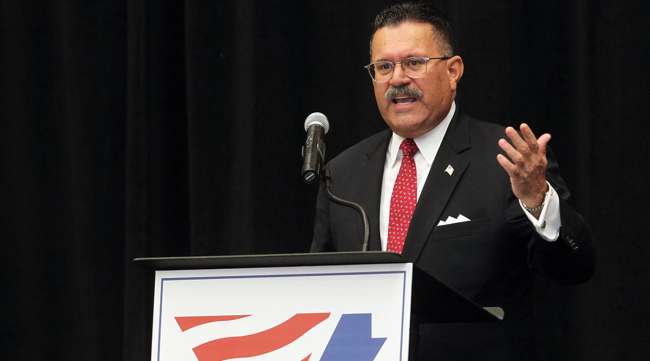Staff Reporter
FMCSA Imposes Lifetime Ban on Truckers Convicted of Human Trafficking

[Stay on top of transportation news: Get TTNews in your inbox.]
The Federal Motor Carrier Safety Administration has announced a final rule that permanently bans commercial motor vehicle drivers who have been convicted of human trafficking.
The rulemaking, announced July 16, specifically disqualifies drivers who use a truck to commit a felony involving human trafficking. The crime, which involves the use of force to obtain labor or a commercial sex act, exploits about 25 million people, according to the U.S. Department of Transportation’s Advisory Committee on Human Trafficking.
The final rule gives states three years to come into compliance with this regulation, which may involve conforming their licensing statutes.
By enforcing a lifetime ban on any CMV driver convicted of severe human trafficking, we aim to deliver a strong and effective deterrent to this abhorrent behavior.
FMCSA Administrator Ray Martinez
“The commercial motor vehicle industry is uniquely positioned to help detect and report human trafficking, and thankfully professional drivers’ efforts often bring an end to these tragic situations. Sadly, however, some human trafficking activities are facilitated by the use of commercial trucks or buses,” FMCSA Administrator Ray Martinez said in a press release. “By enforcing a lifetime ban on any CMV driver convicted of severe human trafficking, we aim to deliver a strong and effective deterrent to this abhorrent behavior.”
The federal rule reflects a proviso outlined in the bipartisan No Human Trafficking on Our Roads Act, which was signed in January 2018.
The rulemaking announcement arrived shortly after the Advisory Committee on Human Trafficking submitted its final report to DOT on July 2. The committee, required by the Combating Human Trafficking in Commercial Vehicles Act, includes leaders of organizations that fight modern slavery, academics, and representatives of the trucking, bus, rail, aviation, maritime and port industries.
The final report, which consists of 47 pages of text and 77 pages of appendices, is titled “Combating Human Trafficking in the Transportation Sector.” The report lists indicators and strategies that apply to various members of the transportation industry, including truckers and people who operate truck stops and travel centers.
The report urges fleet executives to visibly support anti-trafficking initiatives, partner with organizations such as Truckers Against Trafficking and establish a timeline for training programs. Similarly, truck stop operators are encouraged to participate in public awareness campaigns and partner with law enforcement groups.

Paris
Kendis Paris, executive director of Truckers Against Trafficking, is one of the industry representatives who serves on the Advisory Committee on Human Trafficking.
“Truckers Against Trafficking is working to build a mobile army of transportation professionals dedicated to recognizing and reporting cases of human trafficking,” Paris told Transport Topics. “Any person, regardless of their livelihood, who is convicted of this heinous crime should face severe consequences in order to prevent future exploitation.”
Truckers can play an important role in deterring human trafficking because they spend a lot of time on the road. The report indicates that, from 2007 to 2018, people identifying themselves as truckers made 2,250 calls to the National Human Trafficking Hotline.
Committee member Sherri Garner Brumbaugh, president of Findlay, Ohio-based Garner Transportation Group, described members of the trucking industry as “eyes and ears” on the road. Garner’s drivers use training materials produced by Truckers Against Trafficking.

Garner Brumbaugh
“I am pleased to know that our president and [Transportation] Secretary [Elaine] Chao are committed to eradicating the horrific act of human trafficking,” Garner Brumbaugh said. “The action taken today highlights their commitment to bringing attention to this issue.”
The report also identifies state departments of transportation, which intersect with many modes of travel and often have the resource of human capital, as important agencies in combating trafficking.
The committee, formed in October 2018, was designed to develop strategies for reporting human trafficking and craft recommendations for DOT-funded programs to combat the crime. The committee held three public meetings and conducted one teleconference before finalizing its report.
“This is an important step in the departmentwide campaign to keep America’s roadways, railways, airways and waterways from being used for human trafficking,” Chao said in a press release.




